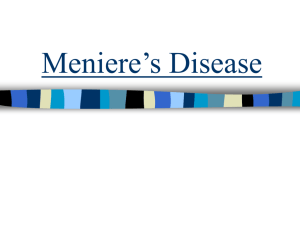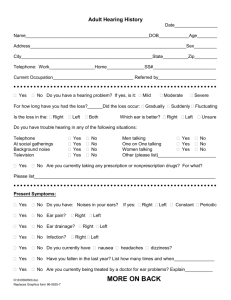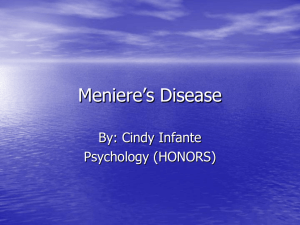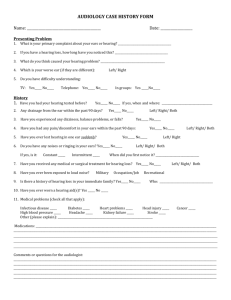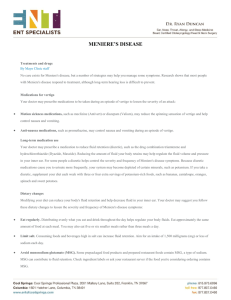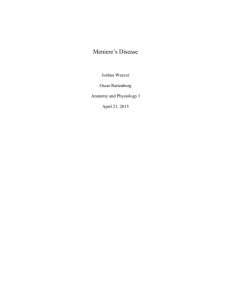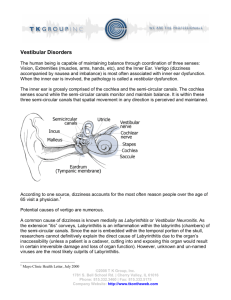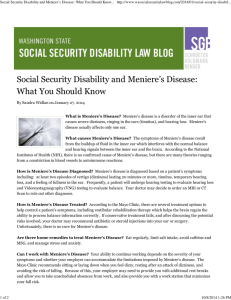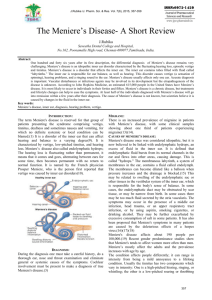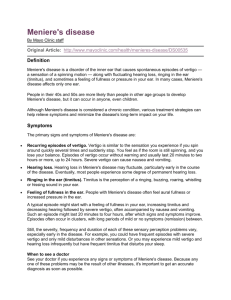Meniere's Disease
advertisement
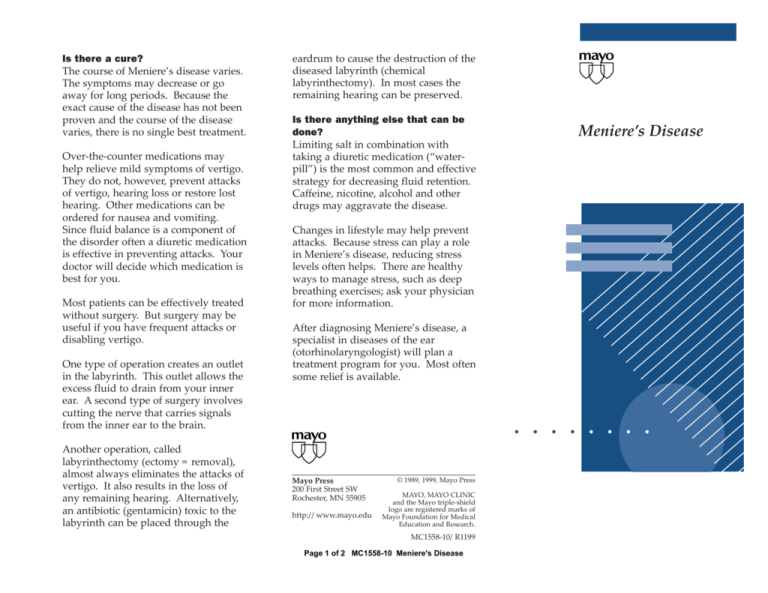
Is there a cure? The course of Meniere’s disease varies. The symptoms may decrease or go away for long periods. Because the exact cause of the disease has not been proven and the course of the disease varies, there is no single best treatment. Over-the-counter medications may help relieve mild symptoms of vertigo. They do not, however, prevent attacks of vertigo, hearing loss or restore lost hearing. Other medications can be ordered for nausea and vomiting. Since fluid balance is a component of the disorder often a diuretic medication is effective in preventing attacks. Your doctor will decide which medication is best for you. Most patients can be effectively treated without surgery. But surgery may be useful if you have frequent attacks or disabling vertigo. One type of operation creates an outlet in the labyrinth. This outlet allows the excess fluid to drain from your inner ear. A second type of surgery involves cutting the nerve that carries signals from the inner ear to the brain. Another operation, called labyrinthectomy (ectomy = removal), almost always eliminates the attacks of vertigo. It also results in the loss of any remaining hearing. Alternatively, an antibiotic (gentamicin) toxic to the labyrinth can be placed through the eardrum to cause the destruction of the diseased labyrinth (chemical labyrinthectomy). In most cases the remaining hearing can be preserved. Is there anything else that can be done? Limiting salt in combination with taking a diuretic medication (“waterpill”) is the most common and effective strategy for decreasing fluid retention. Caffeine, nicotine, alcohol and other drugs may aggravate the disease. Changes in lifestyle may help prevent attacks. Because stress can play a role in Meniere’s disease, reducing stress levels often helps. There are healthy ways to manage stress, such as deep breathing exercises; ask your physician for more information. After diagnosing Meniere’s disease, a specialist in diseases of the ear (otorhinolaryngologist) will plan a treatment program for you. Most often some relief is available. Mayo Press 200 First Street SW Rochester, MN 55905 http://www.mayo.edu © 1989, 1999, Mayo Press MAYO, MAYO CLINIC and the Mayo triple-shield logo are registered marks of Mayo Foundation for Medical Education and Research. MC1558-10/R1199 Page 1 of 2 MC1558-10 Meniere's Disease Meniere’s Disease Meniere’s (men’yerz) disease is a disorder of the inner ear. It leads to attacks of vertigo, a sensation of spinning or falling. Other symptoms include distortion of sound, loss of or fluctuations in hearing, tinnitus (ringing in the ears) and a feeling of pressure in the affected ear. Who gets Meniere’s disease? Both males and females are affected. There is no hereditary link with the disease. The first symptoms may occur at any time but often strike in middle age. At first, the problem involves only one ear. Later, 10 to 20 percent of people with the disease will have symptoms in both ears. How is the inner ear involved? Structures within the inner ear make hearing and balance possible. Two of those structures are the cochlea and the semicircular canals (see illustration). The cochlea is shaped like a snail. It is basic to the hearing process. The semicircular canals are loop-shaped tubes that lie at right angles to each other. They normally detect head movements and assist the brain in adjusting one’s balance. These membrane-lined tubes are connected and filled with a liquid called endolymph (endo = within, lymph = fluid). Because these tubes make a series of twists and bends, this area of the ear is often called the labyrinth. The exact cause of Meniere’s disease is unknown and may vary from person to person. In most patients there appears to be increased amounts of endolymph which enlarges, stretches or swells the labyrinth. The pressure of this extra fluid may damage cells of the membrane, which explains the hearing loss and the periodic attacks of severe vertigo. In others it may be related to an autoimmune process (similar to rheumatoid arthritis or Lupus) or even possibly allergy. How does an attack of Meniere’s disease feel? Often an attack of Meniere’s disease begins with sudden onset of vertigo. This may last only a few minutes or may go on for hours. Cold sweats, nausea, vomiting and diarrhea may also occur. Before the attack, you may feel a sense of pressure or fullness and a low-pitched ringing in your ears. B A Meniere’s disease can impair your hearing and sense of balance if fluid swells the structures of your inner ear: (A) cochlea and (B) semicircular canals. (Courtesy of Mayo Clinic Health Letter.) Page 2 of 2 MC1558-10 Meniere's Disease After the attack subsides, your balance may remain unsteady for a few days. This imbalance may or may not be severe enough to affect your normal activity. Meniere’s disease attacks have no set pattern, and time between attacks varies widely. Some people suffer two or three bouts each week. Other people go weeks, months or years between attacks. How is hearing affected? During the initial attacks of vertigo, you may have a brief decrease of lowtone hearing in the affected ear. Loud sounds may cause discomfort or pain. The hearing loss and ringing may become permanent. The decrease in hearing may be minor, but if both ears are affected, hearing loss can be a major disability. Use of a hearing aid may help because it will increase the volume of sound. Other hearing problems also may occur. Sounds may become distorted. For example, the pitch of a musical note does not sound the same in the affected ear as in the normal ear. In this situation, when clarity is impaired, a hearing aid may not help you understand what is being said.
